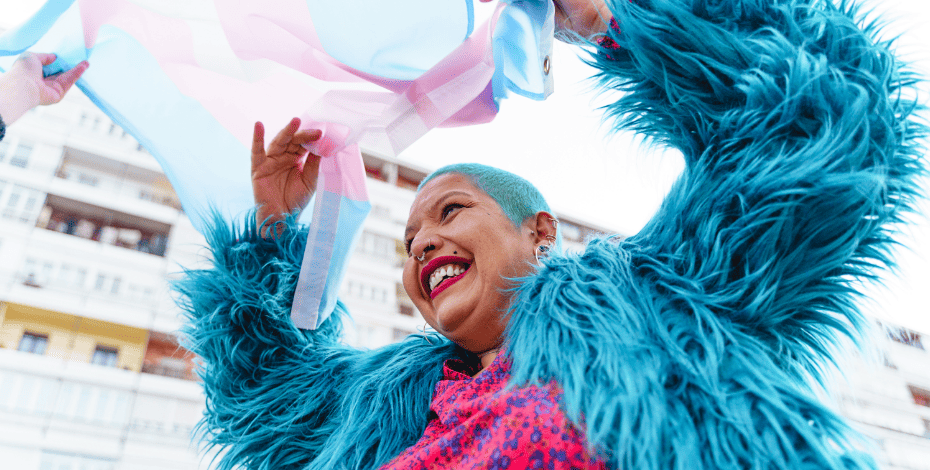
Gender euphoria and the role of physiotherapy

LGBTQIA+ Kate Gallo talks about trans body image, the importance of gender euphoria and how physiotherapists can support and enable it.
Acceptance and awareness play a vital role in determining health outcomes for the LGBTQIA+ community.
For many transgender and gender-diverse individuals, positive body image and alignment of identity and gender can be life-changing and life-saving.
Many of us find affirmation when we look in the mirror and feel confident about ourselves and how the world will perceive
us.
For the trans and gender-diverse community, a contributing factor to positive body image is a feeling of congruence between identity and external self or how one is perceived by others.
This feeling is called ‘gender euphoria’.
As we move towards models of empowerment, trans-affirming researchers, organisations and the LGBTQIA+ community have encouraged a shift away from ‘gender dysphoria’ as the sole focal point of trans health and identity.
This term describes a dissonance between a person’s internal gender identity and their external perception and sense of self.
A change in terminology changes the narrative that has historically correlated trans experiences with trauma and negativity and acknowledges that dysphoria should not be seen as primarily a medical issue.
What is gender euphoria?
Gender euphoria is an emerging term used by trans and gender-diverse individuals to describe feelings of affirmation and
empowerment associated with their experience of gender.
Gender euphoria can also refer to a range of positive feelings related to affirmation of one’s identity, including comfort, confidence and clarity (Austin et al 2020).
Studies on gender euphoria emphasise physical body, social experiences and identity as determinants of a positive sense of self (Beischel et al 2021).
Every physiotherapist can take simple but meaningful steps to help facilitate affirming care and allyship for the trans and gender-diverse community.
Gender euphoria is a unique experience for every trans person and not all trans people will feel validated in their gender simply
by conforming to societal conventions of attractiveness or of femininity, masculinity or androgyny.
For some individuals, gender euphoria may be synonymous with a social transition, such as being referred to by a new name or using certain pronouns that align with their identity.
Others may find medical transitioning, including access to hormones and/or surgery, to be more meaningful.
Some people may not need to change their appearance at all but will feel validated when they have access to a community that accepts them and is tolerant.
Why is gender euphoria so important?
Research demonstrates that participants who experienced gender euphoria were less likely to report high levels of psychological distress and to have experienced recent suicidal ideation.
When trans-affirming practices that enable experiences of gender euphoria are implemented, individuals have increased
resilience and mental wellbeing (Grant et al 2024).
Experiencing gender euphoria can therefore be essential to the safety and positive health outcomes of trans and
gender-diverse individuals.
What role can physiotherapists play?
Every physiotherapist can take simple but meaningful steps to help facilitate affirming care and allyship for the trans and gender-diverse community.
Allyship can be as easy as acknowledging that every person’s experience of gender and identity will differ and that recognising the individual needs of the person you are supporting is often the most important first step.
Visible allyship and acceptance might involve using inclusive language and documentation processes that allow for accurate self-identification and encouraging autonomy and choice during consultations.
Examples include giving your client the option of keeping clothing on during an assessment or offering the choice to practise exercises without you watching if they feel more comfortable doing so.
Enquire about what gender euphoria feels like for your client, as an individual.
By seeking to understand what helps your client feel confident and empowered, you can adopt a strengths-based approach to treatment.
For example, asking your client to describe a place or time when they feel most affirmed in daily life and recommending that they complete their home exercise program in this situation.
Connection to other trans and gender diverse individuals in the community is an important aspect of feeling affirmed.
You can help by making yourself aware of resources available online (such as TransHub or Transcend Australia) and of
other LGBTQIA+ affirming practitioners or organisations in your area.
Discover local community groups for trans and gender diverse people to recommend to your client.
Being prepared with resources and a network of safe referrers can be a clear indicator of your willingness to support the wellbeing of the trans community.
Experiencing gender euphoria can be life-changing and incredibly affirming.
We all play a role in assisting transgender and gender-diverse individuals to feel supported and live a life of authenticity and joy.
>> Kate Gallo APAM (she/they) is a queer and neurodivergent physiotherapist working in a private multidisciplinary clinic in Sydney’s Northern Beaches.
Quick Links:
Course of Interest:
LGBTQIA+ Affirming Physiotherapy – Part A
© Copyright 2025 by Australian Physiotherapy Association. All rights reserved.





